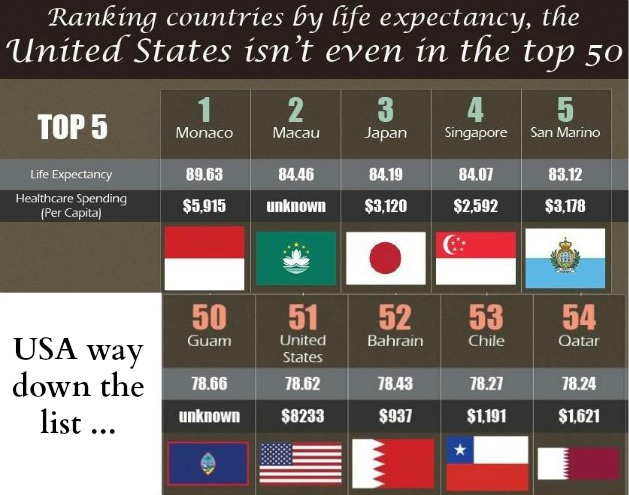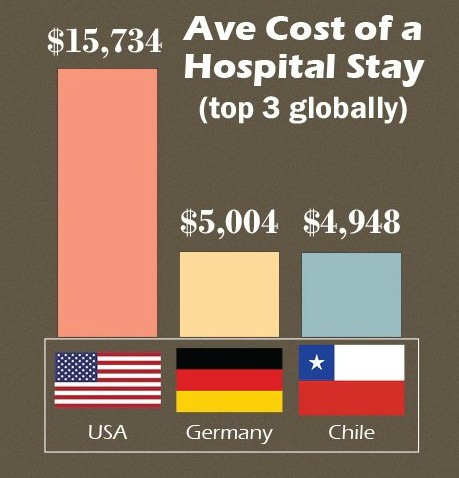
It’s no secret that the healthcare system in the United States is beyond broken. What’s worse, Congress does not seem capable of fixing it anytime soon. Despite spending far more per capita than any other country on medical care, the United States does not even rank in the top 50 countries for life expectancy. This is exactly why health care sharing is growing exponentially in recent years! People are FED UP.
Attempts to fix the problems have only seemed to make matters worse. Medical costs have continued to explode since the creation of Medicare in the mid-1960s despite new regulations being periodically enacted over the years to attempt to control costs.
The Affordable Care Act (Obamacare) is the latest attempt to “control” costs and bring sanity to the healthcare insurance industry. Unfortunately, as of this writing, health insurance premiums continue to increase with individuals and families required to pay for an ever-larger share of their coverage even when employed by large companies, companies which only a few years ago, covered most or all of the cost.
A full-time teacher I know recently confided that her out of pocket expenses for health care through her employer more than doubled (same company, same coverage) with the recent launch of the Affordable Care Act, a law which has yet to live up to its name.

For those following a healthful diet and lifestyle who rarely if ever require a doctor’s care, the frustration with healthcare insurance is two-fold. First, the sobering realization that the rapidly rising expense for medical coverage is due in large part to the GMO-ridden Standard American Diet and high stress/low activity lifestyle of a consenting majority suffering from a plethora of serious health problems being “managed”, never resolved, by overpriced pharmaceutical drugs.
Secondly, the knowledge that in the event healthcare insurance is ever needed, that conventional drugs and surgery would be the only treatments covered by insurance with any holistic or alternative treatments paid for out of pocket.
This reality hit home with me a few years ago when I tried in vain to have a preventative breast thermogram covered by my medical insurance instead of a cancer-causing mammogram. You can read about that saga here.
In essence, relying on healthcare insurance is being caught between a rock and a hard place. Not only is it very expensive, but even in the event of serious illness, you won’t get the coverage and treatments you desire if you are alternatively minded.
For example, let’s say you or a loved one is diagnosed with colorectal cancer. With healthcare insurance, you would in all likelihood be forced into surgery/chemo/radiation even if you have identified a different treatment protocol with a higher probability of success with less toxic side effects.
Makes no sense does it?
Rather than continuing to flush money down the toilet every month paying for healthcare insurance we felt was throwing good money after bad, my husband and I decided to seek out a completely different approach to meeting our family’s health care needs.
What we discovered is a concept that is very new, but at the same time, very old.
Health Care Sharing: An Idea Whose Time Has Come
Our primary goal was to identify a financially sound approach to meeting our family’s health care needs that preserved our freedom of choice when it came to treatment options. We started to investigate the historical concept of “mutual aid societies,” organizations that were crucial to American life up until the beginning of the last century. In 1910, an estimated one in three Americans belonged to such an organization, which provided temporary help to those who became ill or lost a job, for example.
The rise of government programs such as food stamps, Medicaid, unemployment insurance and welfare gradually caused the disappearance of mutual aid societies and the insurance model to take its place.
In the 1990s, the concept of a mutual aid society formed the basis for the development of a new model for meeting an individual or family’s health care needs: Health Care Sharing. It is important to understand that health care sharing it is not healthcare insurance, but rather a way to meet health care needs by balancing them with the shares the members fund on a monthly basis.
Why We Switched to Healthcare Sharing
After much investigation, thought, and discussion, we ultimately decided to take the bold step and cancel our healthcare insurance with Humana and enroll with Samaritan Ministries, founded in 1994 and the largest of three health care sharing organizations in the United States. When I originally wrote this post in March 2014, Samaritan had 105,000 members (33,000 households) in all 50 states. As of February 2017, these numbers have more than doubled to more than 224,000 members and 68,000 households.
Our decision to switch was primarily based on the positive testimonials from friends who were longtime members of Samaritan and had used it for everything from heart attacks to births of babies. In addition, my husband who is from Australia was very keen on the idea as mutual aid societies similar, but not identical, to the concept of health care sharing are popular in his home country and he had used one for years for medical coverage prior to moving to the United States.
While the monthly cost of Samaritan is not significantly different than the $450/month family policy we had with Humana, the peace of mind knowing that when and if we have a medical need, we get to choose our health care provider and course of treatment with 100% of the need being met is priceless. In addition, Samaritan members share in needs starting after the first $300 spent (Samaritan Classic), while the Humana policy we used to rely on had a very high deductible.
Another big plus is the tremendous satisfaction of knowing that our health care dollars are not going to support treatments and therapies that we don’t philosophically agree with.
Different Samaritan Policies
Note that Samaritan offers different policies. Our family has Samaritan Classic, where the monthly cost never exceeds $495, but there is also Samaritan Basic where the monthly cost for a family is $250-400/month.
In addition, policies start at $100/month for a single-person membership with the oldest head of household 29 or younger. To compare both plans and the monthly cost based on household size, download an information packet or go to this online calculator.
Health Care Sharing vs Obamacare or Group Insurance
Perhaps the best news of all is that health care sharing societies such as Samaritan Ministries is a cost-effective alternative to ObamaCare and individual insurance policies. It’s even cheaper than the group insurance offered by large companies in most cases.
If you are in a similar quandry about your health care situation, I would encourage you to investigate the concept of health care sharing for yourself.
Click here for more information or to download an information packet.
*Please note that Samaritan Ministries is not for everyone. Depending on where you live and your religious affiliation, you may not meet membership criteria. However, if you know of other organizations with a health care sharing philosophy, please include this information in the comments section.
UPDATE on our Samaritan Experience
We’ve now been with Samaritan Ministries for almost 7 years and couldn’t be happier or more satisfied. We still often wonder why we didn’t switch sooner. We would have saved so much money and stress! Our Samaritan policy is even covering one of our children now in college!
graphics used with permission of bestnursingmasters.com









Lorraine Contreras
Sharalee , have you ever heard of this? Seems interesting!
Alison Bell Belt i was looking on the website and i am pretty sure its just no getting drunk.
Does Samaritan still require no drinking? Maybe we’ll look into Healthshare.
Howdy, Alison. Just so you know, there are two options in the guidelines for alcohol:
Abstain completely with the exception of Communion.
or
Limit the consumption to moderate amounts so as to never drink to drunkenness.
Samaritan Ministries has always allowed moderate drinking, and has recently changed the guidelines to allow the occasional celebratory use of tobacco as well, FYI
We joined Samaritan Ministries in January 2013 and we are very happy. We have not had to put in a request for a need, but we have been so blessed to be sending our monthly share to other Christians in need. The government probably has a target on our heads as far as these sharing ministries go, but God know all about it and will continue to provide!
Do any of these share groups accept people with pre-existing conditions?
Samaritan Ministries doesn’t turn anyone down for health reasons, however, preexisting conditions are not shared. You can find all the guidelines at their website. A preexisting condition can be listed as a special prayer need, which folks send to voluntarily. Hope you find a good solution for your situation!
Samaritan is a great solution if you are healthy. Insurance companies can not deny anyone insurance for pre-existing conditions. Samaritan’s secret to containing costs is that not only do you have to be a christian in good standing but a healthy christian.
In a typical U.S. insurance pool about 5 percent of enrollees will spend 50 percent of the money. About 10 percent will spend 70 percent. The numbers differ a bit from group to group, but you get the idea: a small number of people spend most of our health care dollars in any given year.Unfortunately, some of those 10% are Christians from nice families.
If Samaritan allowed any of the 10% who represent 70 percent of costs it would have to increase their rates significantly. The insurance companies don’t want the sick people and neither do sharing ministries. I don’t think Jesus would be happy about turning away the sick. I hope Samaritans membership grows to be large enough that they can change their policy on pre-existing conditions.
We use Christian Healthcare Ministries. I believe Pre-E can be shared by the gold members after the first year.
We canned our traditional health insurance when we were paying over $800 a month for $15k individual deductibles ($45k family), and they wouldn’t even put our regular doctor visits, prenatal care, or birth expenses towards our deductible because our family doc is a naturopath and we were planning a homebirth. SMI actually waives the $300 for homebirth and covers it from the very first dollar. More importantly though, they are real people and I enjoy the peace of knowing that our monthly share is going to another family, not towards the purchase of some golden shower curtain in a high-rise executive office suite for a company who lobbies against the true health of this nation.
I didn’t know your husband was from Australia! Hello from back home mr @healthy home economist !
Catherine Linson why a provisional status and what does that entail?
Provisional status costs an additional $80 per month for that you work with a mentor. My wife was on provisional for 3 months when we first joined because she was taking a low dose of medication. She had regular contact with the mentor and now is off provisional.
Liz Collins – check out Liberty Healthshare. They did not even ask if we go to church.